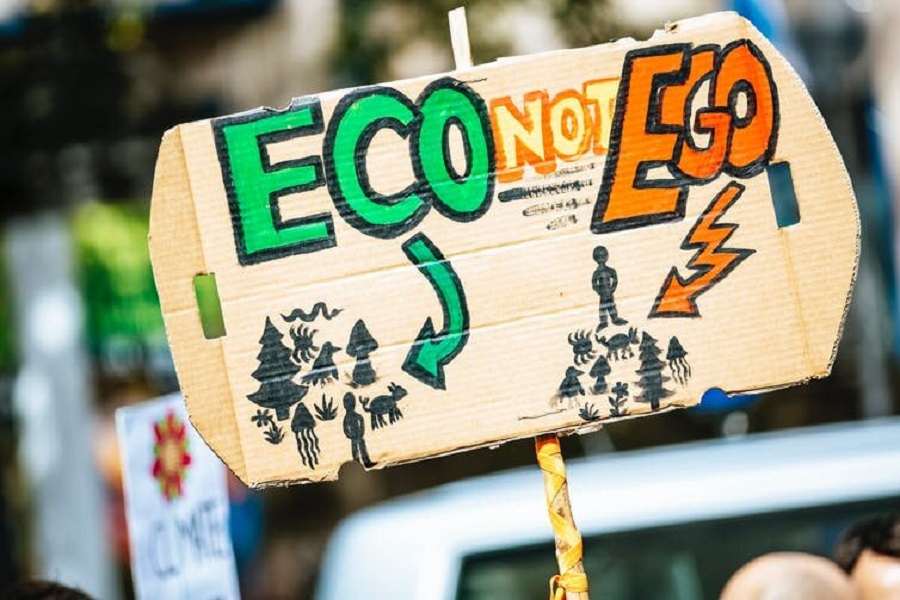Both of these are harmful, dangerous and have the potential to wipe out our whole species; so why do we treat the climate crisis with less urgency?
In the first episode of the Invisibilia podcast’s sixth season, host Alix Spiegel opens by comparing the heartbeat of a human, a black-capped chickadee and an elephant. “The bigger the scale of the animal, the slower the tempo of its heart,” Spiegel points out. It’s an analogy that’s helpful for understanding other crises as well.
One of the biggest problems facing all life on Earth right now is human-caused climate change, but there’s a problem in how we relate to it: The scale and tempo are different from the human pace of life.
Coronavirus, however, is happening at a speed that humans can understand, fear and react to. The virus is spreading at a rate that’s both disturbingly fast (for healthcare workers, people who need to get home and those who are sick). It’s also just the right tempo to get humans’ immediate and focused attention. In fact, there are a lot of parallels between the coronavirus and climate change, if you think about it.
Both are existential threats that are directly affected by individual choices and actions but need coordinated, global action to slow them down. Both will hurt or kill the most vulnerable people.
Both need the same kind of action, but that coordinated response is only happening with coronavirus. Scientists are working on a vaccine. Governments are asking people in urban areas to hunker down for weeks or longer, scrambling to find money to keep the economy on solid footing, and creating legislation to protect workers in various ways.
These large, structural changes seem to have had a positive effect on the places where the virus had a head start (China, Singapore and Hong Kong) and are key to “flattening the curve” globally. Clearly, this pandemic is best dealt with through swift, coordinated action. The fact that it’s uncomfortable and inconvenient is less important than saving lives in the near-term and a few months out.
A lack of coordinated effort on climate change
 Some cities like Sydney, Australia, are taking the lead on putting smart climate change policies in place. (Photo: Victor Maschek/Shutterstock.com)
Some cities like Sydney, Australia, are taking the lead on putting smart climate change policies in place. (Photo: Victor Maschek/Shutterstock.com)
The same cannot be said for climate change, which has been responded to variously, depending on the leadership in power in a given country and what else is going on. There’s certainly a lack of coordinated effort on the issue — the United States removed itself from the Paris Climate Agreement while at the same time, some cities in the U.S. are working hard to reduce carbon emissions. Quite a few countries and cities around the world are also taking significant action. (Reykjavik, Sydney, The Hague, and San Francisco, I’m looking at you).
But action is much, much slower, and despite impassioned speeches, rallies, fundraising, advertising and science communication around the issue, there just never seems to be enough will to get significant measures or funding passed to reduce greenhouse gases.
As Stephanie Kelton, a professor of economics and public policy at Stonybrook University, tweeted:
“Rather surreal watching pundits field the “where is all of this money going to come from?” question with ease now that we’re talking about an existential crisis unlike, I dunno, climate change.”
It seems many people agree with that assessment. A new poll of 20,590 adults found that the majority put climate change on par with the pandemic. In the survey conducted by Ipsos, 71{85424e366b324f7465dc80d56c21055464082cc00b76c51558805a981c8fcd63} of global participants agreed that in the long term, climate change is as serious a crisis as COVID-19.
‘We’ve seen that governments can act’
This is not to suggest coronavirus should not receive the attention or response that it has, but if we are serious about saving the lives of vulnerable people, climate change needs to be more of a priority moving forward. It’s a public-health crisis, too.
“We’ve seen that governments can act, and people can change their behavior, in a very short amount of time,” May Boeve, executive director of the climate advocacy group 350.org, told Fast Company. “And that’s exactly what the climate movement has been asking governments and people to do for years in the face of a different kind of threat — the climate crisis — and we don’t see commensurate action. On the one hand, it shows that it’s possible to do this, and it’s possible for this kind of mobilization of resources to take place in a short amount of time. In that sense, that’s encouraging.”
Both climate change (and the resulting heat waves, droughts and intense storms), and coronavirus have a clear consensus of scientists behind them giving warnings about the future. Both have already killed people and led to economic damage. And like the difficult, expensive and temporarily inconvenient measures we are taking to reduce coronavirus now, the same could be done to get the U.S. onto renewable energy, fast. The policies and technology exist; it’s simply up to us to act.
Perhaps once we’ve seen how effective massive, organized action for a public-health crisis can be, and that we can save lives when we come together, we’ll be able to tackle climate change. We’ll have the knowledge that with hard work supported by all, we can make a difference and save lives. It’s possible to avert the worst of climate change, too, if we realize that the former slow-moving tempo of planetary climate fluctuation has almost caught up to human time.
Original source: https://www.mnn.com

